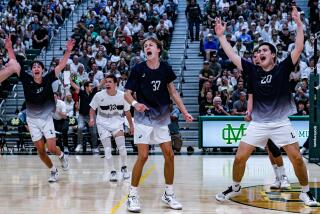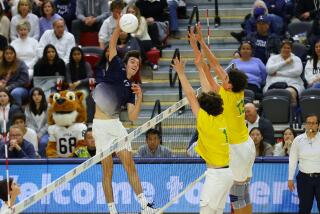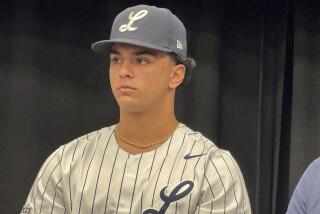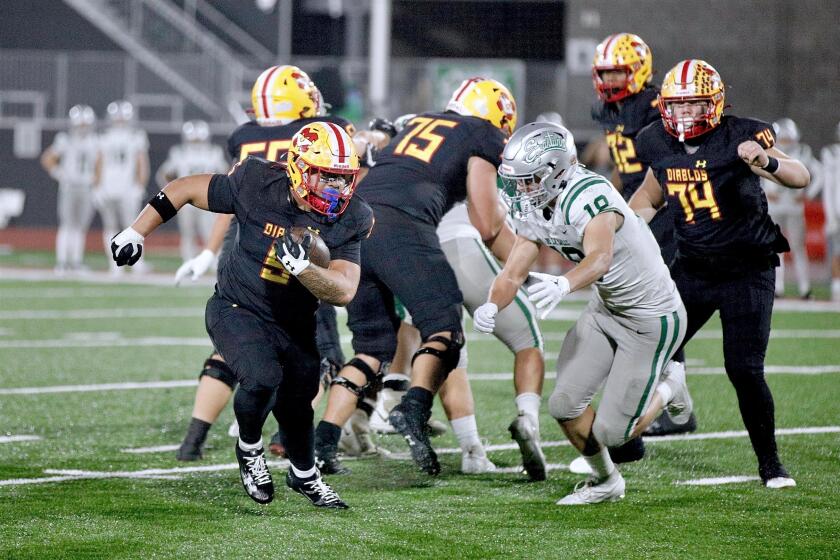SECOND TO NONE : Loyola Second Baseman Darrel Deak Is Making the Most of Opportunity to Be an Everyday Player
Sometimes, some time is all that it takes to turn an unimposing utility infielder into a big-hitting star.
Playing time, that is.
“I feel more comfortable at the plate knowing that I’m playing every day,” Loyola Marymount’s Darrel Deak said. After a weekend series against San Diego where he went five for 12 with a home run, a triple and seven runs batted in, the switch-hitting Lion senior is batting .325 (52 for 155), the fourth-highest average among the Loyola’s everyday players.
“Knowing that I’m playing at second base every day has made me a lot more comfortable than in the past.”
Going into this season, Deak knew he would be an everyday player. He has started Loyola’s past 45 games. Along with his batting average, Deak is second on the team in RBIs with 46, and his eight home runs this season--two of them to deepest center field in a doubleheader against Hartford--have boosted his career total from 13 to 21.
“Some of his home runs have been absolute bombs,” Loyola Coach Chris Smith said. “It’s like the swing, where his power has been evident since he’s been here.”
These impressive numbers did not appear from thin air. Entering the season, Deak was a player who showed flashes of potential. He had a career batting average of .294, and had hit 13 home runs in three years, including a grand slam as a freshman, and a 450-foot home run last year over the light standard at Arizona State in the NCAA Regionals. Deak also has tremendous arm strength, always a plus for an infielder.
But there was no permanent position for Deak. In 1988, he started the season at shortstop, played some first base and also spent time as the team’s designated hitter. As a sophomore, he again was at shortstop. However, Deak spent all of last year filling in gaps as a utility infielder, giving other players rest, and filling in for injured players. Along with his 80 career RBIs, he had 80 strikeouts in 466 at bats.
“He was inconsistent, but his talent was obvious,” Smith said. “There was no question he could succeed. . . . A lot of it is just that he’s older. He’s been around the block now. He’s been through summer ball. One thing about this person is that he is even, no matter how he does. If he goes zero for four he has the same attitude as if he went three for four. I do not know if that was the case earlier in the season.
“But I think that also, a lot of his numbers are from the fact that he’s got to one position and stayed there.”
Deak and Smith also have spent time on his batting mechanics, trying to create a swing with a consistent form from either side of the plate.
“I’ve had to change my swing,” said Deak, a natural right-hander. “A lot of times, I am a dead pull left-handed hitter, and I’ve been learning how to go with the pitch from a left-hander. Coach Smith has helped at toning down my swing. In my sophomore year, I had a lot of strikeouts (33), and he’s always been messing around with it.
“I still am a pull hitter from the right-handed side. I tend to pull everything. But left-handed, now I can go the other way with it. It’s kind of hard to change my right-handed swing because I do not see that many right-handed pitchers. I’ll see one, maybe, once a week, so it’s harder to change.”
Smith said that creating a consistent swing for switch-hitters is one of the more difficult things to do. In looking at Deak’s career batting average of .289 entering this season, Smith said that because Deak hits from both sides of the plate, the numbers are deceiving.
“Here we go again,” Smith said. Now he hit around .290, and you say that’s bad. But it is against both left and right-handers. What if he hit from just the right side of the plate and hit .330, but could not hit a left-hander? You’ve got to give a switch-hitter time.”
Although his batting average for this year is 31 points above his career average, Deak is not content with the season. Certainly, his fielding percentage could have used an equal boost. He has made seven errors and has a fielding percentage of .967.
“I’m really unhappy with the way I’m playing,” Deak said. “I just always expect to do better.”
Deak will graduate from Loyola Marymount with a business degree next month, but wants to play baseball professionally. He says he has already talked with scouts from the Dodgers.
Smith says that there is no question that Deak will get drafted.
“Darrel Deak is not done playing baseball,” Smith said. “Darrel Deak goes into professional baseball and plays somewhere. He’s got great hands, great arm strength for a second baseman. I’m trying to think if he’s got the best arm on the team or not. It will be interesting to see what the pros try to do with him. They could convert him to a catcher.
“I think Darrel Deak is on an upswing. He’s only gotten better. He’s only getting better. He’s going to be a good (professional) player. I do not know how high his drive is. But he has got the even temper you need for baseball. If he lets his swing work for him, he may do something.”
More to Read
Get our high school sports newsletter
Prep Rally is devoted to the SoCal high school sports experience, bringing you scores, stories and a behind-the-scenes look at what makes prep sports so popular.
You may occasionally receive promotional content from the Los Angeles Times.






